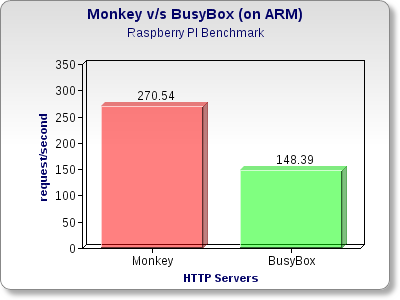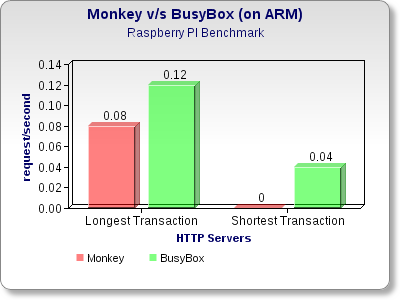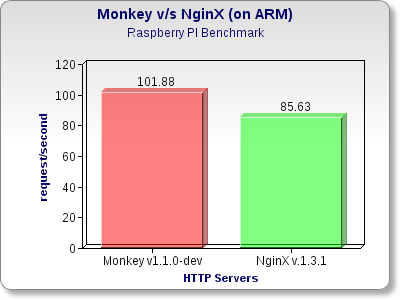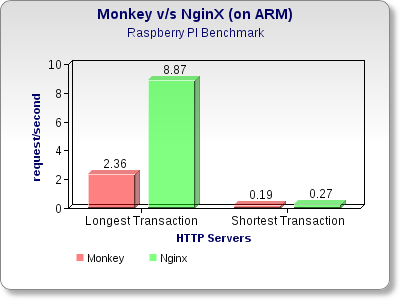Some time ago, I mentioned 5 web servers (mathopd, thttpd, busybox httpd, boa and lighttpd) suitable for embedded systems (including those featuring no MMU processors) and low end machines.
I’ve recently come across Monkey web server, a lightweight open source Web Server for Linux (2.6.29 or greater), which has been designed with focus in embedded devices. Monkey is currently supported on ARM, x86 and x64, although a quick analysis of the source code shows it forks, so it won’t be supported on processors that do not feature a memory management unit (MMU) without modifications.
Monkey supports the following features:
 HTTP/1.1 compliant
HTTP/1.1 compliant- Virtual Hosts
- Asynchronous networking model (event-driven)
- Indented configuration
- Plugins Support
- C API Interface
- Other features through base plugins:
- SSL
- Security
- Log writter
- Directory Listing
- Shell: Command line
The developers have benchmarked Monkey against busybox httpd and nginx on a now well-know ARMv6 platform: the Raspberry Pi. They used Siege v.2.72 benchmarking tool to perform the tests instead of Apache Benchmark (ab) because the former is said to provide more accurate results because it has a lower latency than ab.
Here are the results between Monkey web server and Busybox httpd.
The left chart shows the number of transactions per second and the right chart shows the shortest and longest transaction times. In this benchmark, they used 10 concurrent users download an HTML file in localhost and Monkey delivers better performance on the metrics shown.
Now, let’s see the results between Monkey 1.1.0 (development version) and nginx.
In this benchmark, they used 100 concurrent users downloading a PNG file in localhost, so the results in this benchmark are not directly comparable to the previous test results for busybox vs monkey. Monkey is also shown to outperform nginx both in terms of requests per second and longest and shortest transaction times.
Monkey can support PHP and Mysql (via extensions), but does not implement PHP-FastCGI yet (this is work in progress), so you won’t be able to use this web server for things like WordPress.
The latest version – Monkey 1.0.1 (codenamed Monkey I/O) – has been released on the 15th of June. The web server is a small source code download (322KB), and can easily be build using the usual configure + make procedure. [Update: Sander commented that you can also install Monkey (version 0.9.3) in Debian/Ubuntu with “sudo apt-get install monkey”]
For further details, documentation and support, you can visit Monkey Project website.

Jean-Luc started CNX Software in 2010 as a part-time endeavor, before quitting his job as a software engineering manager, and starting to write daily news, and reviews full time later in 2011.
Support CNX Software! Donate via cryptocurrencies, become a Patron on Patreon, or purchase goods on Amazon or Aliexpress









